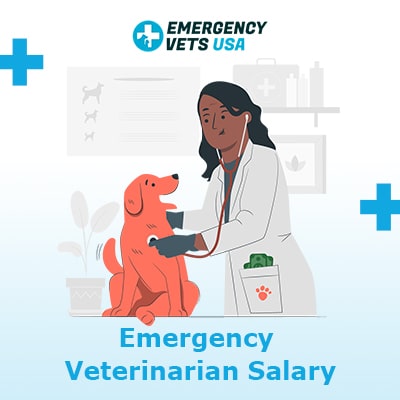How Much Do Emergency Vets Make
Emergency medicine is a fast paced field that requires immense dedication.
With a challenging field often comes an increase in salary, as emergency veterinarians are required to perform a large range of medical tasks.
So what is the average salary of an emergency veterinarian?
In this article we will discuss the typical range of emergency veterinarian salaries, as well as what it takes to become an emergency veterinarian.

How To Become An Emergency Vet
A career in veterinary emergency medicine requires extra time and dedication than that of a standard DVM (Doctor of Veterinary Medicine).
An emergency animal hospital will care for animals with serious medical complications, requiring a vet with specific training and experience.
The standard path to becoming an emergency vet includes:
- Participating in clinical rotations required by your veterinary program
- Completing a veterinary program and obtaining your DVM degree
- Pass the NAVLE
- This step is optional, but it is ideal to participate in an emergency medicine internship to gain additional training in this field. You can then become board certified after this internship and once you pass additional testing for your board certification
- If you choose not to participate in an internship, you should then gain at least 2 years of experience in a standard day practice. This will ease you into emergency medicine and teach you the basics
- Begin work in an emergency animal hospital alongside skilled emergency veterinarians
Board Certification For Emergency Vets
Some veterinarians choose to become board certified in emergency medicine to further prepare them for their career.
Board certified veterinarians are sought after in every aspect of veterinary medicine, and can typically receive higher salaries because of this.
Becoming board certified is a way to gain additional respect in your specialty of choice, and is even required in some types of specialties.
While you do not have to be board certified to become an emergency veterinarian, let’s discuss the details of making it happen.
- Begin a 1 year emergency medicine internship once you achieve your DVM and pass your NAVLE
- Complete a 3 year residency in an emergency facility that runs an approved residency program
- Achieve publication in a peer reviewed, scientific veterinary research journal
- Pass the board certification examination for emergency and critical care
Annual Salary Of An Emergency Vet
An emergency veterinarian will be required to handle much more complicated cases than that of the standard veterinarian, meaning the salary is generally higher.
You will often be required to work longer and more unpredictable hours as well, further increasing the incentive for a higher wage.
The standard salary for an emergency veterinarian ranges from $100,000-$120,000 a year.
While this will vary from practice to practice, this is what you can typically expect.
How Much Do Board Certified Veterinarians Make?
As we discussed above, board certified critical care veterinarians are highly respected in veterinary medicine.
The skilled training they receive in their residency sets them apart from non-board certified vets, and makes them deserving of a higher salary.
A board certified emergency veterinarian can make an average of $140,000-$180,000 a year.
This amount will vary based on the practice of choice, and can be even higher when working in specialty facilities.
Relief Emergency Veterinarian (Part Time Work)
A relief emergency veterinarian is a veterinarian that does not have a set practice to work at full-time.
Relief veterinarians bounce from clinic to clinic, often picking up shifts during busy periods or hours.
While this is not always the case, some vets believe that you can make more as a relief veterinarian due to the high demand for additional help.
A relief veterinarian will often set their required pay amount per shift, and can essentially create their own salary based on how often they are willing to work.
Highest Paid Veterinary Specialties
Though some emergency veterinarians bring in an impressive salary, it is not the highest paid veterinary specialty.
There are other specialties that require a DVM to be board certified, often resulting in a higher salary due to their required training.
The highest paid veterinary specialties by rank include:
- Ophthalmologists – $199,000 annually
- Lab Animal Medicine – $170,000 annually
- Veterinary Surgeons – $140,000 annually
- Internal Medicine – $130,000 annually
- Radiology – $125,000 annually

My name is Amber. I am a dedicated animal lover that turned my passion into my career. I am a Licensed Vet Tech with 12 years of experience in veterinary medicine, but I recently took my career online to help spread accurate information on animal care. With how vast the online world is, I have a strong desire to ensure that the reader always walks away with helpful pet advice. With the experience I’ve gained from my time in this field, I have been able to travel the world, offering my services to as many animal rescues as I can find. If I am not at my laptop, or back home visiting family, you can find me somewhere in the world, cuddling every furry friend that I can find! More About Us
